| Official Name: | Republic of Trinidad and Tobago |
| Official Language: | English, Spanish |
| Area: | 5,131 km2 (1,981 sq mi) |
| Population: | 1,364,000 |
| Time Zone: | UTC−4 |
| Capital City: | Port Spain |
| Elevation (Port Spain): | 66 m (217 ft) |
| Currency: | Trinidadian dollar (TTD) |
| Main Cities: | Port Spain, Chaguanas, Mon Repos |
| Main Port: | Port Spain |
| Required visa for entry: | Nationals from Canada, EU countries, the UK, and others DO NOT require visas. Click here for more information concerning visa requirements. |
| Required vaccination for entry: | Yellow fever. Only for travelers coming from endemic countries. (Review epidemiological alerts by clicking here). |
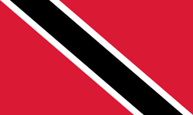
Main Risks:
Theft, robbery, kidnapping, extortion, rape, drug and human trafficking, fraud, vehicle assault.
Executive Summary
Trinidad and Tobago feature medium risks. Security risks increase considerably in remote areas beyond the main cities, but also in impoverished neighborhoods. Due to the surmounting threat posed by crime, we recommend procuring secure transportation services for all travel to the islands, especially for business trips and/or itineraries involving traveling through the countryside. For high-profile trips, we further recommend hiring executive protection services.
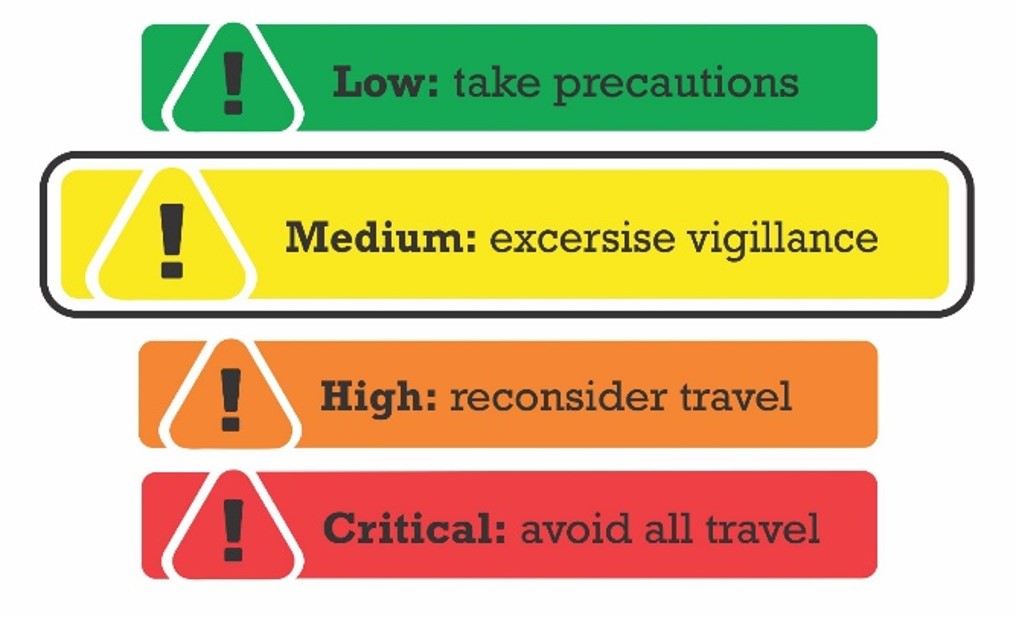
General Risk Level: MEDIUM.
The risk generally remains stable throughout the country. That said, for security reasons, we recommend traveling with a private security-trained driver throughout the trip. As a rule of thumb, avoid remote areas and impoverished neighborhoods. We recommend studying a security plan before traveling to the islands.
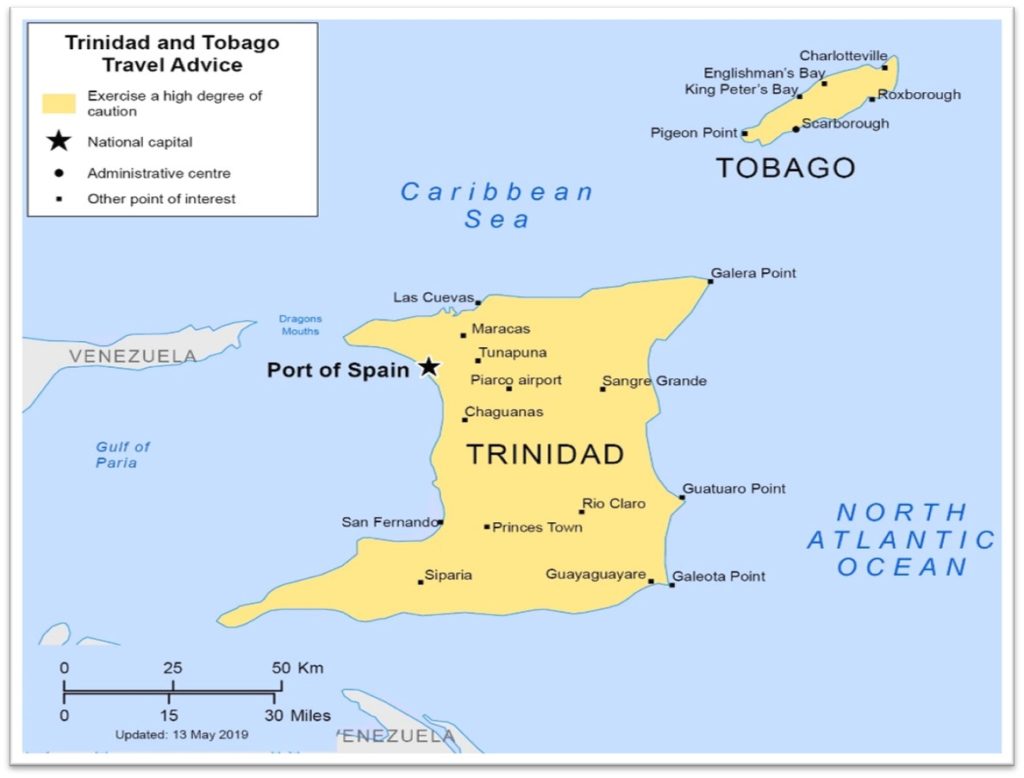
Crime and Security
The main threat to those visiting the islands of Trinidad and Tobago comes from opportunistic low and medium level crime. Violent incidents are known to take place even in centric areas in Port Spain and other cities. The country is noted for having high crime rates and faces challenges from gangs dedicated to extortion crimes and small-time drug-trafficking. Although most violent episodes transpire during dark hours, such incidents are also known to take place during daylight. Foreigners are not necessarily targeted specifically by criminals, yet they are nonetheless exposed. The threat posed by crime remains in relatively remote beachside areas sought by tourists.
For security reasons, we do not recommend traveling to Trinidad and Tobago without previously procuring secure transportation services for the duration of the trip. As a last resource, taxis vetted by the main hotels may be used, preferably booked in advance.
On another note, please bear in mind that Suriname is vulnerable to protracted rains, which can cause flooding and cause heavy disruptions, especially between May and July, and between December and January. Beachside areas are especially affected by inclement weather.
Security in Port Spain
No area in the city is completely safe from crime, including the central areas. It is thus necessary to stay vigilant and mind personal belongings closely. As a rule of thumb, the safest neighborhoods are those housing the middle and upper classes, generally located on high terrain. The safest and most convenient areas to lodge and carry out transactions are Cascade and St. Anns, which are relatively close to the city center (Downtown). These areas are protected by private security elements. It is also feasible to stay at the Villas of Moka, an exclusive residential zone north of Port Spain, or in the middle-class neighborhoods of Goodwork Park, Glencoe, and Westmoorings. While from a security standpoint it is still feasible to stay in the city center, visitors should exercise extra caution due to the threat posed by crime. The same applies to Queens Park, which attracts opportunistic delinquents seeking to steal unattended valuables from people occupied in recreative activities. At any rate, visitors should avoid traveling by night in the city. Moreover, all non-essential travel to high and critical-risk areas should be avoided, especially to Morvant, Laventille, Sea Lots, and Beetham Gardens.
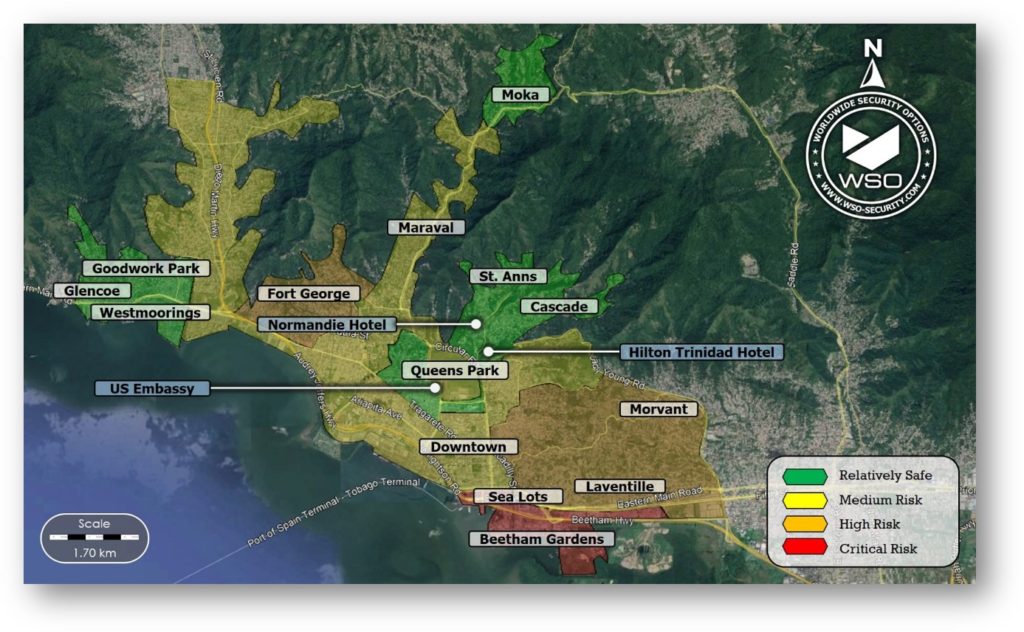
The Piarco International Airport (POS) is the main entry point to the country. It is located about 25 km east of Port Spain. The trip between the capital and the airport should last about 60 depending on traffic. Please consider that the route through Beetham Highway involves crossing through critical-risk areas. There have been episodes where criminals assault drivers caught on traffic while their vehicles were at a standstill. For this reason, it is best to avoid traveling during rush hours. To travel to the capital from POS it is best to avoid the morning hours. In turn, to travel to POS from Port Spain it is best to avoid the afternoon hours, particularly between 15:00 and 18:00.
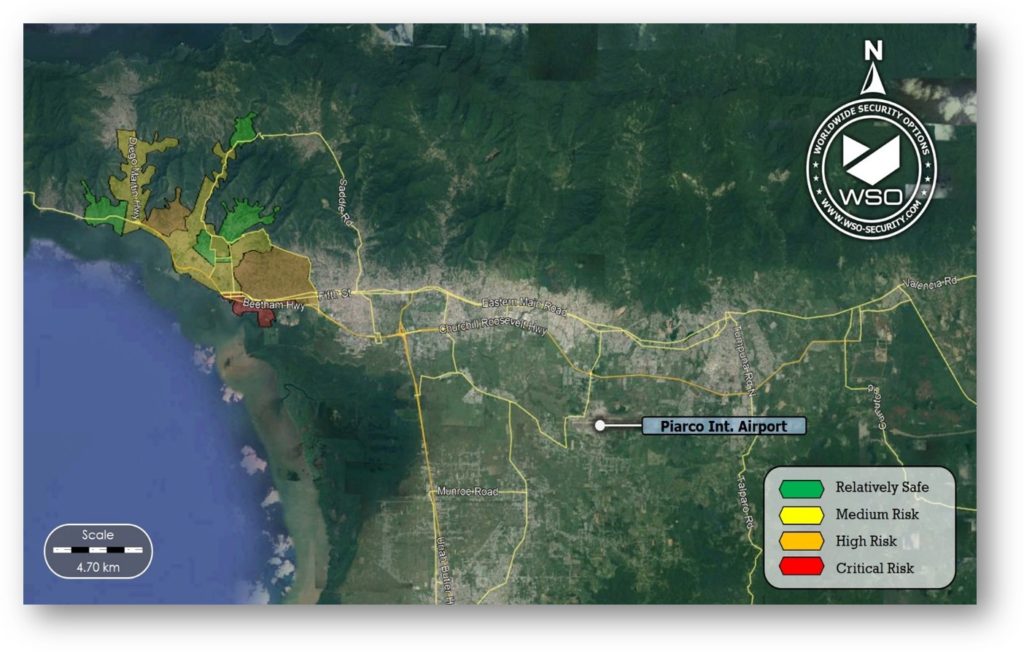
Transportation
For security reasons, public transportation should be avoided. For all itineraries resort to reputable secure transportation services. Only use taxis as a last resource, provided they are vetted by the prominent hotels. That said, please be advised that some taxi drivers might attempt to take advantage of foreign passengers to inflate the price of the trip. For high-profile visits, it is further recommended to hire executive protection services.
The main routes are modern and remain in good condition. However, this is not necessarily the case for secondary and rural routes, which could potentially present heightened security risks, especially while traveling during dark hours or under poor visibility. Therefore, if traveling by land, do not deviate from primary thoroughfares. As a rule of thumb, it is best to avoid routes removed from central localities and which remain in poorer circumstances. Be advised that in Trinidad and Tobago vehicles drive on the left.
If travel to Trinidad and Tobago involves visiting countryside locations, whether for business or tourism, make sure to plan the route in advance under the supervision of local security professionals. Educated assessments should enable the security contractor to determine the safest route and avoid unilluminated or otherwise dangerous paths.
Health and Sanitary Conditions
The islands of Trinidad and Tobago are vulnerable to tropical storms and heavy rains. Travelers should pay attention to forecasts and avoid trips during adverse weather conditions.
Travelers coming from endemic countries are required to vaccinate against yellow fever before coming to the country (review epidemiological alerts clicking here). In any case, it is recommended vaccinating against tetanus, hepatitis A and B, and typhoid. Taking into account the tropical weather, it is very important to wear protection against bugs and avoid leaving body areas uncovered to mitigate the risk of suffering insect and mosquito-borne diseases such as Dengue, Chagas, and the Zika virus. These precautions should be followed at all times while entering remote and jungle areas. The quality of tap water in the islands is generally good. However, this might not be the case in remote or jungle areas. As a precaution, it is therefore recommended to drink sealed bottled water while visiting or staying in such areas.
It is not advised to travel without international health insurance covering emergency medical evacuation to the country of origin.
Take essential health precautions to mitigate the risk of contracting diseases or viruses. Carry masks in crowded places such as airports and maintain rules of social distance and avoid contact with surfaces of common use in public places. Always carry hand sanitizer.
Tactical Recommendations
Exercise vigilance and situational awareness throughout the trip to Trinidad and Tobago.
We recommend procuring private transportation services for all trips to the islands. For high-profile trips, we further recommend hiring executive protection services. For security reasons, do not use public transportation. If required, use taxis vetted by the main hotels as a last resource, preferably booked in advance.
Minimize travel through high and critical-risk areas, particularly while traveling to/from the Piarco International Airport to Port Spain. Given that criminals capitalize on traffic jams to assault drivers, avoid the rush hours.
If travel by route through the countryside is required, avoid all detours, especially while traveling through sparsely populated rural or jungle zones. If possible, plan routes and stopovers ahead with the support of a local security contractor.
Avoid carrying large sums of cash or valuables during the trip. We advise against wearing or carrying items in public that may give the impression of economic affluence and which could attract unwanted attention from criminals.
Avoid traveling in sport or luxurious cars which could attract unwanted attention from criminals.
Do not resist armed robbery attempts. We recommend to always carry a few 100 TTD bills for duress cases, specifically to appease criminals looking for easy money.
For security reasons, minimize travel during night hours in Port Spain and other locations.
We recommend lodging in reputable establishments and hotels with private security. In Port Spain, it is best to stay in St. Anns, Cascade, Moka, Westmoorings, Glencoe, or Good work Park.
Avoid the vicinity of every kind of political demonstration or rally in urban areas. Peaceful protests can be infiltrated by violent elements.
Take all necessary precautions to mitigate the risk posed by mosquito-borne diseases. When visiting remote locations drink sealed bottles if the quality of tap water is questionable.
As a precaution, pay attention to weather conditions in the country before traveling.
Emergency Contacts
Policía: 911
Ambulancia: 811
Fuego: 990
WSO Global Command Center: +1 956 467 4858 / gcc@wso-security.com
Canales de WhatsApp para asesoría o asistencia en seguridad: +593 99 461 1128 / +521 81 1511 3166







